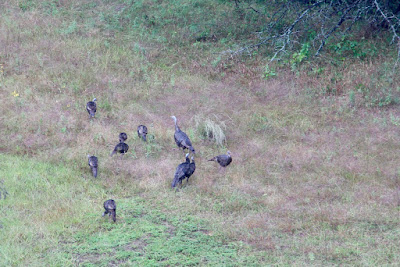Canada is once again smoke-bombing the Midwest. We’re under an air quality alert until noon tomorrow. I’m once again deferring burning fallen, dead branches so I don’t contribute to the problem of fine particulates. By the time winter approaches, I have no doubt our neighbors to the north and west will be only to ready to share a different kind of particulate with US. Obviously, we can’t all live upwind or upstream, right?
 |
| summer turkey flock
Photo by J. Harrington
|
This morning a flock of more than eight wild turkeys, all or mostly hens, some poults(?), pecked their way through the back yard. I’m not sure what they were feeding on, but they’re welcome to the ticks and beetles we’ve been dealing with all season. Goldenrod blooms are appearing in more and more places. Remember, it’s more ragweed than goldenrod that triggers hay fever outbreaks.
Several weeks or so ago I was unaware of the existence of the field of geopoetics, at least by that name. I’ve been interested in bioregionalism for some time. More recently I’ve become enamored of a growing genre know as literary field guides. I had read that the first of that genre is The Sonoran Desert, co-edited by Eric Magrane. Magrane is also a co-editor of Geopoetics in Practice. If you visit us from time to time, you may well be interested in the projects Magrane has been involved in. Here’s a link to the projects page of his web site.
One of Magrane’s co-editors of Geopoetics is Linda Russo, who also has some fascinating work on her web site. I hope you’ll visit each of these sites and poke around. It’s encouraging, I find, to discover folks who are working on alternative ways in which we can relate to and cocreate the world around us. It’s pretty obvious that the way we’ve been doing it through colonial capitalism isn’t working out all that well.
Various Instructions for the Practice of Poetic Field Research
By Eric Magrane
These instructions were created by poet, naturalist, and Spiral Orb editor Eric Magrane in celebration of National Poetry Month 2012, and in conjunction with Spiral Orb Five: A Poetic Inventory of Saguaro National Park and a reading by the same name that took place at the Poetry Center on April 16, 2012 (listen to the event on Voca).
They are designed to get you out into any given environment and enhance your awareness of that given environment in unexpected ways.
1. Note your elevation above sea level. What poems occur here?
2. Map the ¼ mile radius around your home in a poem.
3. Draw a line. On one side of the line, note observations. On the other side, write responses to those observations. Which is which?
4. Choose an object in your field. Make the object the title. Make it the title three times. Write three pieces with this title.
5. List everything that is alive around you. List everything that is not alive around you.
6. Go to a different elevation. What poems occur here?
7. Choose a species you know little about but that lives in your ecosystem. Learn everything you can about that species. Then, go find the species. Write what happens.
8. The first object-poem (see #4) will be your control. Analyze the second and third against the control. What are your conclusions?
9. Find an urban ecotone. Stand there. Write a poem from the dual space.
10. Imagine a rise in sea level. How will that affect your elevation poem?
11. List everything that is natural around you. List everything that is not natural around you.
12. Observe lists #5 and #11. Why did you organize them as you did? Is there such a thing?
13. Stand up and put your arms out. The length of your arms is the circle of the poem.
14. Choose a field you know little about. Find someone in that field to interview. Research the person’s work beforehand, so that you can ask relevant questions. Conduct the interview, then write a poem.
15. Write a poem that takes place over 4.5 billion years.
16. Write a poem that is 3 degrees Celsius warmer than it is now.
********************************************
Thanks for visiting. Come again when you can.
Please be kind to each other while you can.
No comments:
Post a Comment